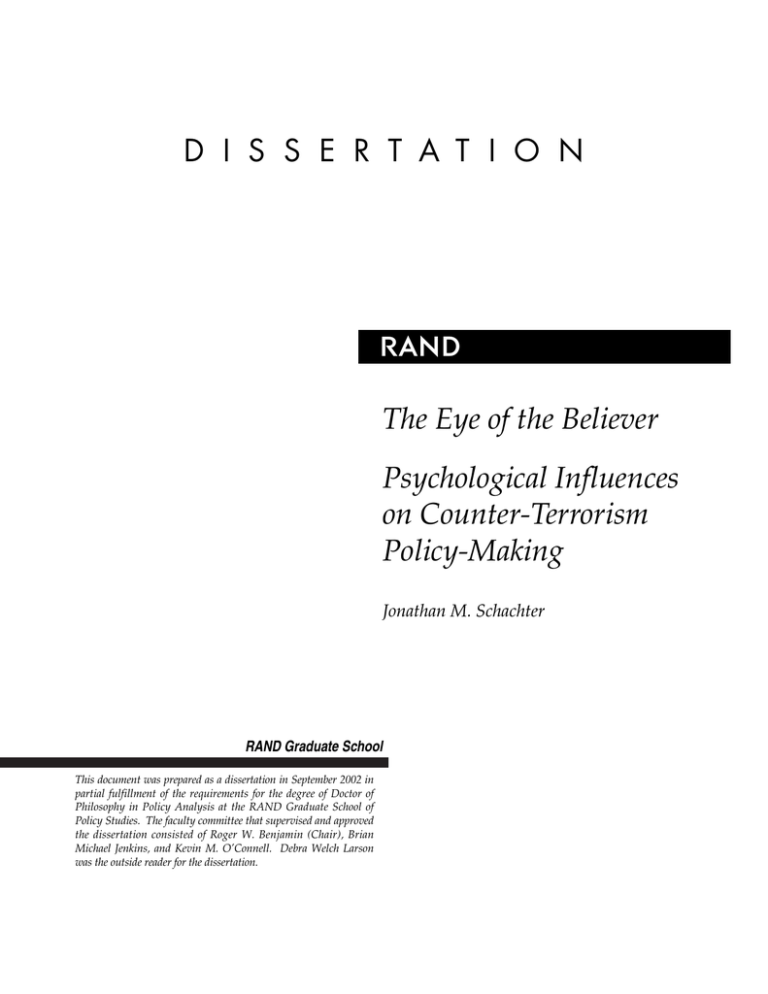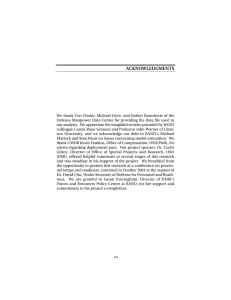
D I S S E R T A T I O N
R
The Eye of the Believer
Psychological Influences
on Counter-Terrorism
Policy-Making
Jonathan M. Schachter
RAND Graduate School
This document was prepared as a dissertation in September 2002 in
partial fulfillment of the requirements for the degree of Doctor of
Philosophy in Policy Analysis at the RAND Graduate School of
Policy Studies. The faculty committee that supervised and approved
the dissertation consisted of Roger W. Benjamin (Chair), Brian
Michael Jenkins, and Kevin M. O’Connell. Debra Welch Larson
was the outside reader for the dissertation.
The RAND Graduate School dissertation series reproduces dissertations that have
been approved by the student’s dissertation committee.
RAND is a nonprofit institution that helps improve policy and decisionmaking
through research and analysis. RAND® is a registered trademark. RAND’s
publications do not necessarily reflect the opinions or policies of its research
sponsors.
© Copyright 2002 RAND
All rights reserved. No part of this book may be reproduced in any form by any
electronic or mechanical means (including photocopying, recording, or
information storage and retrieval) without permission in writing from RAND.
Published 2002 by RAND
1700 Main Street, P.O. Box 2138, Santa Monica, CA 90407-2138
1200 South Hayes Street, Arlington, VA 22202-5050
201 North Craig Street, Suite 202, Pittsburgh, PA 15213
RAND URL: http://www.rand.org/
To order RAND documents or to obtain additional information,
contact Distribution Services: Telephone: (310) 451-7002;
Fax: (310) 451-6915; Email: order@rand.org
- iii PREFACE
This research examines social psychological aspects of the foreign and counterterrorism policy-making processes. It presents common psychological biases
that affect understanding the behavior of foreign actors in general and of substate terrorist groups in particular, and discusses the impact these biases can
have on policies and ways in which the effects of these biases can be limited in
the future. It concludes by presenting a critical analysis of specific counterterrorism policy options for the near- and long-term, with a particular emphasis
on meeting America’s stated policy objective of deterring future terrorism. The
study's findings will be of interest to the intelligence community, to foreign,
defense and counter-terrorism policy-makers and analysts, and to scholars
interested in understanding past counter-terrorism policies with an eye to
improving future policy choices.
Portions of this study were conducted as part of RAND’s continuing program of
self-sponsored research. We acknowledge the support for such research
provided by the independent research and development provisions of RAND's
contracts for the operation of its Department of Defense federally funded
research and development centers: Project AIR FORCE (sponsored by the US. Air
Force), the Arroyo Center (sponsored by the U.S. Army), and the National
Defense Research Institute (sponsored by the Office of the Secretary of Defense,
the Joint Staff, the unified commands, and the defense agencies). The opinions
and conclusions expressed are those of the author and should not be interpreted
as representing those of RAND or any of the agencies or others sponsoring its
research.
-vCONTENTS
PREFACE.................................................................................................................................................... iii
ABSTRACT ................................................................................................................................................vii
ACKNOWLEDGEMENTS .......................................................................................................................ix
INTRODUCTION.......................................................................................................................................1
CHAPTER ONE: CONTEXTUALIZATION AND ITS DISCONTENTS .........................................7
CHAPTER TWO: PRINCIPLE, PRACTICALITY AND POLICY-MAKING IN THE
AFTERMATH OF THE 1973 ARAB-ISRAELI WAR ..........................................................................35
CHAPTER THREE: POST-OSLO HAMAS TERRORISM: WYE AND WHY NOT? ...................57
CHAPTER FOUR: DETERRING AL-QA’IDAH: PAST, PRESENT, POWER AND
PERCEPTION ............................................................................................................................................79
CHAPTER FIVE: CONCLUSION AND POLICY RECOMMENDATIONS: THE ERA OF
‘CONSTRAINMENT’.............................................................................................................................103
SOURCES CONSULTED ......................................................................................................................135
- vii ABSTRACT
This dissertation examines social psychological aspects of the foreign and
counter-terrorism policy-making processes. It presents common psychological
biases that affect understanding the behavior of foreign actors in general and of
sub-state terrorist groups in particular, and discusses the impact these biases can
have on policies and ways in which the effects of these biases can be limited in
the future.
Three illustrative historical case studies are presented, namely, examinations of
then-Secretary of State Henry Kissinger’s negotiation with Syrian president Hafiz
al-Asad following the 1973 Arab-Israeli War; the U.S. and Israeli understanding
of the interests of and use of violence by Hamas and the Palestinian National
Authority (PNA) since 1993; and the gross differences in perception of American
counter-terrorism deterrent messages by both the senders and receivers of those
messages that ultimately led to the deterrence failure on September 11. In each
case, particular focus is placed on how these actors have understood U.S.
behavior. Other examples are taken from past and current U.S. efforts to combat
terrorism. Together, these cases demonstrate how often-imperceptible motivated
and/or unmotivated psychological biases have affected the actors involved,
distorting their situational assessments and constraining their subsequent
decision-making, resulting in harm to U.S. long-term interests with consequent,
substantial loss of life.
The demonstrable impact of these psychological factors suggests that counterbias strategies, including creating awareness of preconceptions and biases and
employment of the placement methodology for bringing history to bear on
decision-making, might have led to different sets of decisions. Woven
throughout the case studies are alternative placements of the main actors, and a
presentation of the related policy options that might have been available and
- viii known to U.S. decision-makers if they had access to similar analysis based on
these strategies. In other words, assumptions are both challenged and redeveloped for the tasks at hand. The dissertation concludes by presenting a
critical analysis of specific counter-terrorism policy options for the near- and
long-term, with a particular emphasis on meeting America’s stated policy
objective of deterring future terrorism.
- ix ACKNOWLEDGEMENTS
Many friends and colleagues helped me throughout the crafting of this
dissertation who are due my heartfelt thanks. My dissertation committee
members, Brian Michael Jenkins, Kevin O’Connell and especially committee
chairman Roger Benjamin, each with a wealth of experience in, and remarkable
perspective on, different aspects of the subject, have been enthusiastic supporters
and reviewers from the very beginning. Our discussions of the evolving text
have been a high point of my stint at the RAND Graduate School (RGS), and to
my mind, represent what intellectual discourse is supposed to be. I am grateful
for their guidance, encouragement and support. In addition, I did not know
when I first enrolled in Deborah Welch Larson’s graduate seminar on the making
of American foreign policy, the impact she and her important work on the
psychology of foreign policy would have on my studies. The dissertation is
stronger for her many constructive comments. I thank her for her insight and her
inspiration.
I want to thank a number of RGS colleagues who have helped me by realitychecking my thoughts and in navigating the often-stormy waters of graduate
school: Brian Houghton, Joel Shapiro, Lorne Teitelbaum and Katia VlachosDengler. Thanks also to Paul Davis, who, as the leader of a project examining
broader questions of deterrence strategy for countering terrorism, read and
reread numerous versions of the text that ultimately became Chapters Four and
Five, providing many helpful comments and suggestions along the way.
Whether face-to-face or by telephone from across the country or around the
world, John Godfrey has been, and he continues to be, a source of tremendous
knowledge, built on a wealth of unique experience and complemented by an
incisive sense of humor. His perspective and friendship have enriched the
dissertation and broadened my horizons.
-x-
Since I first met him when I was an undergraduate, Peter Hayes has been a sage
mentor and a dear friend, and in both roles he has left an indelible impression
upon me and upon my work. From the dissertation’s inception, Peter patiently
has helped me develop ideas and generously and thoughtfully read and
commented on successive drafts. I am so grateful.
Finally, I would like to thank my parents for their boundless support and
encouragement. With boundless love and gratitude, I dedicate this work to
them.





